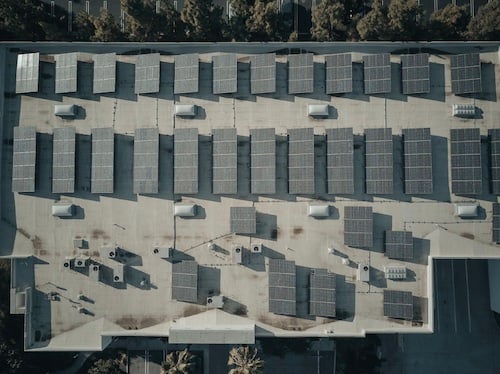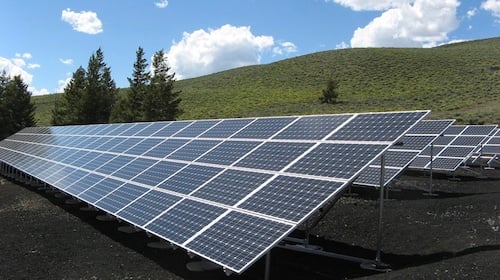Harnessing the Power of the Sun: Advantages of Commercial Solar Panels

Photo by https://www.pexels.com/@kindelmedia/ from Pexels
As businesses search for ways to operate more sustainably and efficiently, solar power is increasingly coming into the spotlight. In recent years, commercial solar panel installations have seen a notable uptick, driven by both a sense of environmental responsibility and the allure of long-term savings.
This article aims to explore the many advantages of integrating solar panels into commercial operations. From the clear environmental dividends to the increasingly attractive economic incentives, we will uncover why solar power is not merely an alternative form of energy—it's fast becoming a business imperative.
The Environmental Upside
At a time when climate change headlines are awash with dire predictions, businesses hold a pivotal role in steering us toward a more sustainable future. Unsurprisingly, solar power investments are overtaking oil. By harnessing the sun's rays, commercial solar panels convert light into electricity, all while emitting zero greenhouse gases.
In addition to reducing carbon emissions, the adoption of solar energy by businesses has a ripple effect on environmental preservation. With fewer fossil fuels burned, there's a marked decrease in air pollution, thus contributing to healthier ecosystems and improved public health. This isn't merely an eco-conscious move; it's a vital step in creating a lasting legacy for future generations.
Solar power also offers the profound benefit of water conservation. Unlike other forms of electricity generation that require vast amounts of water, solar panels operate on the photovoltaic process, which is virtually water-free.
So, while the immediate effects of adopting solar power are quantifiable, the long-term implications are invaluable. It allows companies to actively partake in the fight against climate change, helping to construct a world that future generations can not only live in but thrive.
Economic Incentives
If the environment's plea doesn't sway you, perhaps the compelling economics will. Long gone are the days when switching to solar power was considered a costly indulgence. Thanks to advances in technology and manufacturing, the price per watt of solar panels has been steadily declining, making this renewable energy source more accessible than ever.
The upfront investment in commercial solar panels often yields considerable returns over time. The savings on electricity bills can be substantial, as solar power diminishes dependence on more expensive, grid-supplied electricity. This not only offers a buffer against fluctuating energy prices but also allows companies to predict their energy expenditures more accurately.
However, the economic allure doesn't end with the efficiency of commercial solar panels. Various governments around the world offer enticing fiscal incentives to make the transition to solar even more appealing. Tax credits, rebates, and even grants are commonly available, serving to offset the initial costs of installation. Some regions also offer "feed-in tariffs," where businesses can sell excess electricity generated by their solar panels back to the grid, creating additional revenue.
Energy Independence
The subject of energy security is increasingly entering the mainstream conversation, and for good reason. With geopolitics often influencing the availability and cost of fossil fuels, businesses that rely solely on traditional energy sources find themselves at the mercy of variables beyond their control. This is where solar power comes into play, offering a remarkable degree of energy independence.
Solar panels allow companies to produce electricity right where it's needed—on-site. This decentralization minimizes reliance on utility grids and mitigates the risks associated with energy supply disruptions. Moreover, surplus energy generated can often be stored in advanced battery systems, serving as a backup in times of high demand or low solar availability.
Even more intriguing is the concept of "net metering," a mechanism that allows businesses to feed their surplus electricity back into the grid. Not only does this contribute to the larger community by augmenting the supply of clean energy, but it also allows companies to actually make money from their solar installations, turning what used to be a cost center into a potential profit center.
Technological Advancements
As we stand at the cusp of a green revolution, the technological strides in solar energy are nothing short of revolutionary. Gone are the clunky, inefficient solar panels of yore; today's models boast significantly improved efficiency, durability, and adaptability.
Recent innovations have led to the development of bifacial solar panels, which capture sunlight from both sides, thereby increasing energy output. This is particularly beneficial for businesses with limited space, as it maximizes the energy yield per square foot. Additionally, smart grids and advanced monitoring systems now allow for real-time tracking of energy generation and consumption, enabling businesses to manage their solar assets more efficiently.
Furthermore, advancements in battery storage solutions are game-changing. Modern batteries not only store surplus solar energy more effectively but also integrate seamlessly with solar panel systems, providing a cohesive energy solution. This is particularly vital for businesses that operate outside regular working hours, ensuring that the power generated during daylight can be utilized when the sun goes down.
Wrapping Up

Photo by https://www.pexels.com/@pixabay/ from Pexels
In a world facing pressing environmental and economic challenges, the adoption of commercial solar panels is not just an option—it's an imperative for businesses seeking sustainable growth. By making this forward-thinking shift, companies not only stand to gain operationally and financially, but they also contribute to a broader societal movement towards a cleaner, more resilient future. In choosing to harness the sun's abundant energy, businesses illuminate a path that others can follow, sparking a virtuous cycle of innovation and responsibility.
Also read
- Revolution Beneath the Streets: Smarter Solutions for Underground Infrastructure Rehabilitation
- The Future of Natural Gas Generators in Business
- How Next-Gen Materials Are Reshaping the Future of Solar Energy
- When and Why Solar Projects Need Historical Weather Analysis
- Europe’s Solar Surge: Trends Driving Photovoltaic Installations Forward
